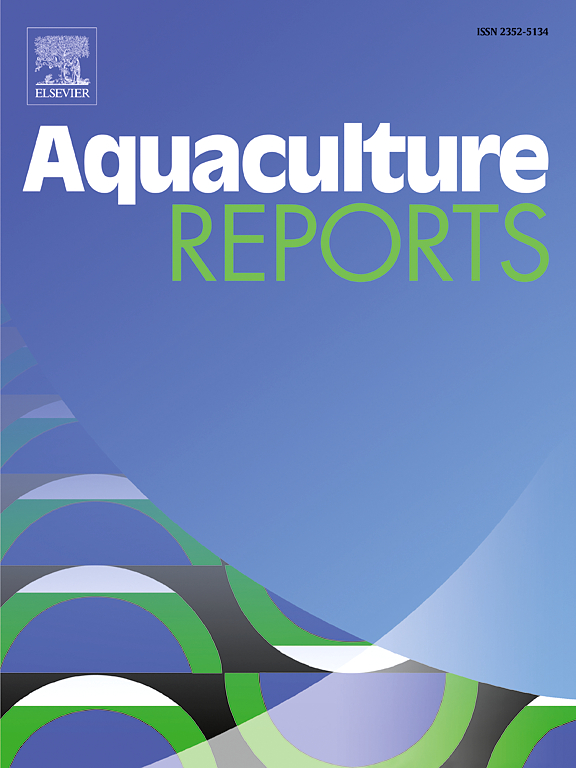Enhancing muscle physicochemical properties and nutrient distribution in black seabream (Acanthopagrus schlegelii) through dietary linoleic acid supplementation
IF 3.7
2区 农林科学
Q1 FISHERIES
引用次数: 0
Abstract
This study investigates the effects of dietary linoleic acid (LA) on the growth, lipid metabolism, muscle nutritional composition, texture characteristics, volatile and non-volatile substances of black seabream (Acanthopagrus schlegelii). Four isonitrogenous and isolipidic diets with LA levels of 5.30 mg/g (LA5.30), 10.51 mg/g (LA10.51), 15.57 mg/g (LA15.58), and 20.01 mg/g (LA20.03) of LA were formulated. A 13-week feeding trial was conducted on black seabream with an initial weight of 6.69 ± 0.01 g. Results indicated that compared with LA5.30 group, dietary LA levels increased the WG and CF. Meanwhile, the contents of LA and n-6 PUFA in liver and muscle significantly increased with increasing dietary LA levels. Hardness and chewiness of black seabream muscle were significantly increased at dietary LA additions of 10.51 mg/g or beyond. Compared with the LA5.30 group, the expression levels of myogenic factors were significantly increased but myostatin was significantly decreased with the increase of dietary LA levels. The results of electronic tongue taste showed that the sweetness value in the black seabream muscle was significantly enhanced in the LA10.51 group while the bitter value was significantly reduced in this group. The composition and relative percentage of volatile substances in muscle also significantly affected by dietary LA levels. In conclusion, dietary LA supplementation could not only improve the growth performance, but also enhance the nutrition and flavor by increasing the nutritional value of muscle, optimizing muscle textural properties, boosting muscle taste, as well as regulating the composition and relative percentage of volatile substances.
饲粮中添加亚油酸对黑鲷肌肉理化特性和营养成分分布的影响
本试验研究了饲料中添加亚油酸(LA)对黑鲷(Acanthopagrus schlegelii)生长、脂质代谢、肌肉营养成分、质地特征、挥发性和非挥发性物质的影响。配制4种等氮等脂饲料,分别为5.30 mg/g (LA5.30)、10.51 mg/g (LA10.51)、15.57 mg/g (LA15.58)和20.01 mg/g (LA20.03)。试验对初始体重为6.69 ± 0.01 g的黑鲷进行了为期13周的饲养试验。结果表明,与LA5.30组相比,饲粮LA水平显著提高了WG和CF,肝脏和肌肉中LA和n-6 PUFA含量随LA水平的升高而显著升高。饲料中添加10.51 mg/g及以上的LA显著提高了黑鲷肌肉的硬度和咀嚼力。与LA5.30组相比,随着饲粮LA水平的升高,肌生成因子的表达水平显著升高,肌肉生长抑制素的表达水平显著降低。电子舌尝结果显示,LA10.51组黑鲷肌肉的甜味值显著增强,苦味值显著降低。肌肉中挥发性物质的组成和相对百分比也受饲粮LA水平的显著影响。综上所述,饲粮中添加LA不仅可以改善生长性能,还可以通过提高肌肉的营养价值、优化肌肉的质地、增强肌肉的口感、调节挥发性物质的组成和相对百分比等方式改善肌肉的营养和风味。
本文章由计算机程序翻译,如有差异,请以英文原文为准。
求助全文
约1分钟内获得全文
求助全文
来源期刊

Aquaculture Reports
Agricultural and Biological Sciences-Animal Science and Zoology
CiteScore
5.90
自引率
8.10%
发文量
469
审稿时长
77 days
期刊介绍:
Aquaculture Reports will publish original research papers and reviews documenting outstanding science with a regional context and focus, answering the need for high quality information on novel species, systems and regions in emerging areas of aquaculture research and development, such as integrated multi-trophic aquaculture, urban aquaculture, ornamental, unfed aquaculture, offshore aquaculture and others. Papers having industry research as priority and encompassing product development research or current industry practice are encouraged.
 求助内容:
求助内容: 应助结果提醒方式:
应助结果提醒方式:


